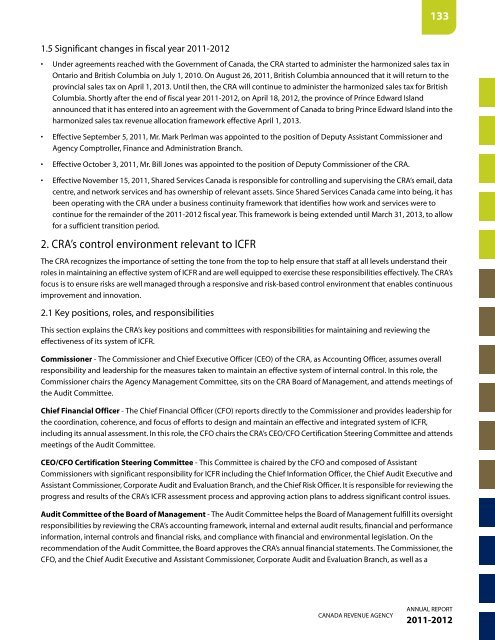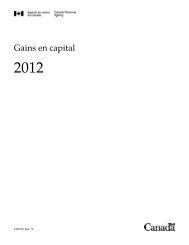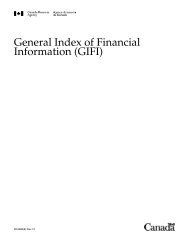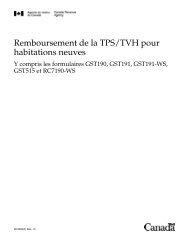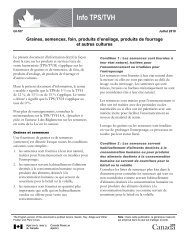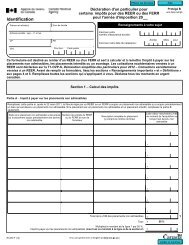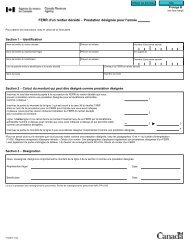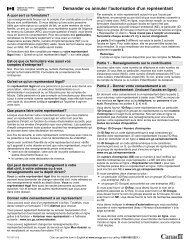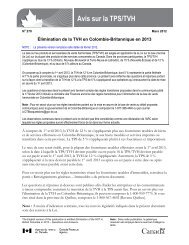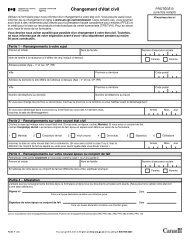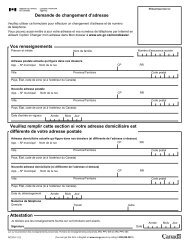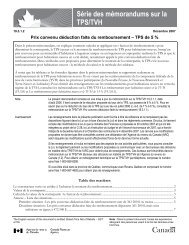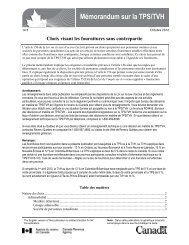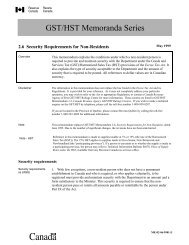CRA Annual Report to Parliament 2011-2012 (PDF - Agence du ...
CRA Annual Report to Parliament 2011-2012 (PDF - Agence du ...
CRA Annual Report to Parliament 2011-2012 (PDF - Agence du ...
You also want an ePaper? Increase the reach of your titles
YUMPU automatically turns print PDFs into web optimized ePapers that Google loves.
1.5 Significant changes in fiscal year <strong>2011</strong>-<strong>2012</strong><br />
Under agreements reached with the Government of Canada, the <strong>CRA</strong> started <strong>to</strong> administer the harmonized sales tax in<br />
Ontario and British Columbia on July 1, 2010. On August 26, <strong>2011</strong>, British Columbia announced that it will return <strong>to</strong> the<br />
provincial sales tax on April 1, 2013. Until then, the <strong>CRA</strong> will continue <strong>to</strong> administer the harmonized sales tax for British<br />
Columbia. Shortly after the end of fiscal year <strong>2011</strong>-<strong>2012</strong>, on April 18, <strong>2012</strong>, the province of Prince Edward Island<br />
announced that it has entered in<strong>to</strong> an agreement with the Government of Canada <strong>to</strong> bring Prince Edward Island in<strong>to</strong> the<br />
harmonized sales tax revenue allocation framework effective April 1, 2013.<br />
Effective September 5, <strong>2011</strong>, Mr. Mark Perlman was appointed <strong>to</strong> the position of Deputy Assistant Commissioner and<br />
Agency Comptroller, Finance and Administration Branch.<br />
Effective Oc<strong>to</strong>ber 3, <strong>2011</strong>, Mr. Bill Jones was appointed <strong>to</strong> the position of Deputy Commissioner of the <strong>CRA</strong>.<br />
Effective November 15, <strong>2011</strong>, Shared Services Canada is responsible for controlling and supervising the <strong>CRA</strong>’s email, data<br />
centre, and network services and has ownership of relevant assets. Since Shared Services Canada came in<strong>to</strong> being, it has<br />
been operating with the <strong>CRA</strong> under a business continuity framework that identifies how work and services were <strong>to</strong><br />
continue for the remainder of the <strong>2011</strong>-<strong>2012</strong> fiscal year. This framework is being extended until March 31, 2013, <strong>to</strong> allow<br />
for a sufficient transition period.<br />
2. <strong>CRA</strong>’s control environment relevant <strong>to</strong> ICFR<br />
The <strong>CRA</strong> recognizes the importance of setting the <strong>to</strong>ne from the <strong>to</strong>p <strong>to</strong> help ensure that staff at all levels understand their<br />
roles in maintaining an effective system of ICFR and are well equipped <strong>to</strong> exercise these responsibilities effectively. The <strong>CRA</strong>’s<br />
focus is <strong>to</strong> ensure risks are well managed through a responsive and risk-based control environment that enables continuous<br />
improvement and innovation.<br />
2.1 Key positions, roles, and responsibilities<br />
This section explains the <strong>CRA</strong>’s key positions and committees with responsibilities for maintaining and reviewing the<br />
effectiveness of its system of ICFR.<br />
Commissioner - The Commissioner and Chief Executive Officer (CEO) of the <strong>CRA</strong>, as Accounting Officer, assumes overall<br />
responsibility and leadership for the measures taken <strong>to</strong> maintain an effective system of internal control. In this role, the<br />
Commissioner chairs the Agency Management Committee, sits on the <strong>CRA</strong> Board of Management, and attends meetings of<br />
the Audit Committee.<br />
Chief Financial Officer - The Chief Financial Officer (CFO) reports directly <strong>to</strong> the Commissioner and provides leadership for<br />
the coordination, coherence, and focus of efforts <strong>to</strong> design and maintain an effective and integrated system of ICFR,<br />
including its annual assessment. In this role, the CFO chairs the <strong>CRA</strong>’s CEO/CFO Certification Steering Committee and attends<br />
meetings of the Audit Committee.<br />
CEO/CFO Certification Steering Committee - This Committee is chaired by the CFO and composed of Assistant<br />
Commissioners with significant responsibility for ICFR including the Chief Information Officer, the Chief Audit Executive and<br />
Assistant Commissioner, Corporate Audit and Evaluation Branch, and the Chief Risk Officer. It is responsible for reviewing the<br />
progress and results of the <strong>CRA</strong>’s ICFR assessment process and approving action plans <strong>to</strong> address significant control issues.<br />
Audit Committee of the Board of Management - The Audit Committee helps the Board of Management fulfill its oversight<br />
responsibilities by reviewing the <strong>CRA</strong>’s accounting framework, internal and external audit results, financial and performance<br />
information, internal controls and financial risks, and compliance with financial and environmental legislation. On the<br />
recommendation of the Audit Committee, the Board approves the <strong>CRA</strong>’s annual financial statements. The Commissioner, the<br />
CFO, and the Chief Audit Executive and Assistant Commissioner, Corporate Audit and Evaluation Branch, as well as a<br />
CANADA REVENUE AGENCY<br />
133<br />
ANNUAL REPORT<br />
<strong>2011</strong>-<strong>2012</strong>


